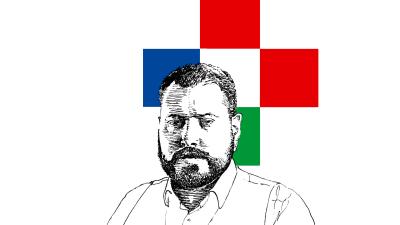Pest, 15 March 1848, 8 a.m. Spring is approaching fast, the weather is finally mild after a long winter. In Pilvax, a café in the city centre close to Franciscan Square, six men are meeting. The discussions are heated, revolutionary fever has been brewing for several days. At dawn, these young men of letters, inspired by French revolutionary ideals, drew up a list of 12 points; so many reformist demands that they intended to impose on the Emperor in order to put an end to censorship, obtain elements of national independence and move towards the rule of law. All of this with the cry of liberty, equality and fraternity.
The poet Sándor Petőfi, an immense figure of the European nationalist romanticism, was the most representative face of this revolution, which was crushed a year and a half later only thanks to the assistance of the Russian Tsar’s armies.
In 1928, during the Regency of Admiral Horthy, 15 March became a bank holiday. Initially shunned by the communists, the holiday was finally reinstated gradually, cautiously, emphasising the republican and social character of the 1848 revolution, but sweeping under the carpet any hint of independence or freedom of expression.
Finally, with the change of regime, 15 March became a bank holiday and has since been celebrated with great pomp.
Budapest, 15 March 2011, 8am. Spring is just around the corner, the weather is finally mild after a long winter. The shops are closed, transport is scarce and Hungary is getting ready to celebrate this special day. Having moved to Hungary in October 2010, this is the first time I am experiencing this bank holidays in Hungary.
For a few days now, cockades have been for sale in all the supermarkets in Budapest, and the day before they were already blooming on people’s chests. Going out to attend the ceremonies, my heart leapt to see the streets draped in the Hungarian tricolour. Red, white and green adorn the fronts of apartment buildings, are displayed on buses, decorate bridges.
It was a day of national communion, an ostensibly unifying event, and I had one of my strongest experiences of Hungarian patriotism. To hear the crowd singing the 19th century marches by heart, all under a forest of flags, does not leave one indifferent.
Budapest, 15 March 2023, 8:00 am. Spring is just around the corner, the weather is finally mild after a long winter. The shops are closed, transport is scarce and Hungary is preparing to celebrate one of its national holidays.
Looking out of the window, of the entire street, I can only see my building showing the national flag. It is not by chance: I have lobbied the building manager to make sure that the flag is never missing on national holidays.
Despite the good weather, faces are grey, and so are hearts. There are hardly any cockades in my working-class neighbourhood. Besides, it's hard to find rosettes in shops this year. I notice a few glances at my cockade chest - blasé, surprised, questioning, friendly. Then, here is the first cockade I see! A young girl, apparently with blue hair and a noticeably overweight, approaches it side by side with a rainbow cockade. A sad-looking old man seems to greet me with a look, his faded cockade hanging askew, without stopping his painful walk with the help of a cane.
God knows I am not a republican at heart. The 15th of March doesn't really appeal to me, the 19th century revolutionaries are not my cup of tea and the current Hungarian political regime is not what I would like to see in the country. I don't hide my monarchist and traditionalist tendency, among others. Also, I have taken part in many debates within the Hungarian right-wing on the wearing of the cockade, the anti-monarchist emblem of its time. But history is a complex matter, judgements after the fact are often unjust and time erodes everything, even the greatest sorrows and offences. After all, the tricolour flag is also Masonic, and yet...
Syncretism is the sedimentation of our collective experiences as a nation and the cement of a collective life voluntarily organised as a state. Breakdown points exist at different times and for a certain duration - never eternally - but the principle of reality must prevail for every patriot: like it or not, we have to deal with a lot of unpleasant things in order to write, together, the national novel and move forward.
So, out of love for Hungary, I wear the red, white and green cockade every 15 March. Some comrades and friends, in disagreement, boycott these bank holidays. I understand them, too.
But I do not believe that the crowd I saw outside on the morning of 15 March 2023 did not wear the cockade because of a philosophical disagreement on the historical and political syncretism to be applied for the national interest. I think we should rather speak of national disinterest.
For it is precisely this lack of interest that I point to as the culprit of this ongoing and now well advanced identity breakdown. Admittedly, Viktor Orbán's Fidesz may have a slight share in the responsibility for this, having tried to recuperate the cockade a decade ago, confusing patriotism with the Fidesz vote, and thus, by extension, the wearing of the cockade with the Fidesz vote. Demonstrations by the left-wing opposition during the Prime Minister's speeches prompted him to avoid speeches in Budapest on 15 March and, above all, to end the truce in political struggle for national unity.
I grew up in the West, and I know only too well the evil that is spreading in Hungary, and which is advancing even faster here than in France, the country of my childhood and of my paternal forefathers. The nation is melting in the sun, because the national feeling, a strong and intimate state of mind, is disappearing.
This is the main failure of Viktor Orbán: the failure of cultural resistance. But how can you blame him? Hungary is a small country, with no capital, no army, no nuclear weapons, passed from the hands of one master to those of another. Today, Hungary is at the mercy of liberalism from across the Atlantic and cannot resist the injunctions of the United States in the matters of gay pride, rubbish TV or mind-numbing music - not to mention clothing, architecture and food. All of us in the West are now called upon to be ersatz homo globalis, sub-Americans of the imperial periphery.
This suggests a post-Orbanian reign and a legacy similar to that of De Gaulle after 1968: a society that was only waiting for the departure of the father of the nation, the last bastion of a voluntarist and unnatural conservatism, to finally make its consumerist revolt and melt into the mould of globalist indifferentiation.
Read also
Country Report: Hungary, April 2023
Between 28 and 30 April, Pope Francis travelled to Hungary on an apostolic visit. During that time, he met with Hungarian leaders, visited the faithful and immigrants, and celebrated a large open-air mass in front of the parliament.
Ferenc Almássy
The Trap of Legal Immigration
Since 2015, immigration has become a major issue in Central Europe where, since the fall of Soviet communism, it was rather emigration that was the main social phenomenon. However, since the famous "migrant crisis" along the Balkan route, a lot has changed. And the faces you see in the streets of Warsaw, Budapest, Prague and Bratislava are changing too.
Ferenc Almássy
Is the end of private cars coming soon?
For better or worse, the car has revolutionised our way of life, drastically changing our relationship with space. I do not intend to take stock of this revolution here and now.










Comments (0)